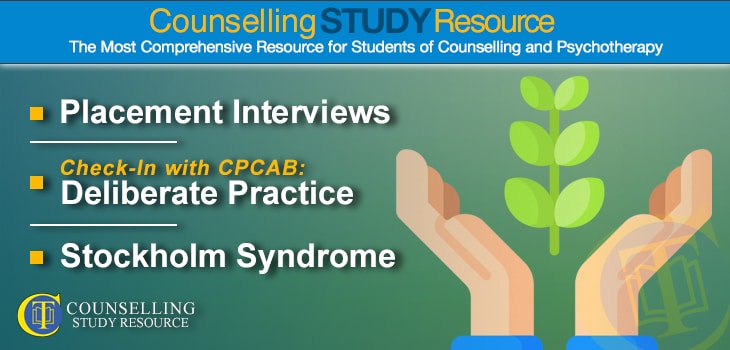154 - Deliberate Practice in Counselling
Placement Interviews - Stockholm Syndrome
In episode 154 of the Counselling Tutor Podcast, Ken Kelly and Rory Lees-Oakes give some tips on interviews for counselling placements. 'Check-In with CPCAB' then looks at the concept of deliberate practice: what it means and how to do it in your counselling practice. Finally, in 'Practice Matters', the presenters discuss Stockholm Syndrome.
Placement Interviews (starts at 1.45 mins)
Going for an interview for a counselling placement can feel very stressful, and so naturally trigger anxiety. Remember that the reason you are feeling that anxiety is because you really care about it, which is a good thing.
Counselling interviews can be very different from other types of job interviews. Rory describes how he was surprised - when he went for his placement interview - to be asked first about his hobbies.
Since counselling is very much about a way of being (rather than a way of doing), who you are and your ability to practise good self-care are important.
So while it's good to be well prepared on counselling theory and skills, do keep an open mind on the areas that the interviewers may choose to focus on. Above all, be yourself.
It is also a good idea to research the agency's website, so that you are familiar with the information given there, e.g. on client group, staff, history etc. This can also help you prepare some questions to ask at the end.
Don't forget just how much you have to offer. Interviews aren't just about you convincing them that you are the right person for the agency; they also provide an opportunity for you to weigh up whether or not you would like to work there.
For example, does the agency provide a good level of support for trainee counsellors (e.g. ensuring that any clients are assessed as being appropriate for you before allocating them to you)?
Interviews aren't just about you convincing them that you are the right person for the agency; they also provide an opportunity for you to weigh up whether or not you would like to work there.
While you may feel desperate simply to find a placement, do try to ensure that the agency's philosophy and values are a good fit with your own. As Ken notes, it is important to find a placement, but it's much more important to find the right placement.
Rory has written a handout that includes a list of possible questions you might get asked at interview. You can access this here.
And why not come along to the Counselling Tutor Facebook group, where you can ask questions and share experiences of counselling interviews with over 30,000 students, qualified practitioners, supervisors and tutors in the world of counselling and psychotherapy?
Check-In with CPCAB: Deliberate Practice in Counselling (starts at 16.10 mins)
Rory talks to Kelly Budd (Head of Qualifications) at CPCAB (Counselling & Psychotherapy Central Awarding Body) about what deliberate practice is, and how to use this concept yourself in your counselling practice.
Deliberate practice refers to practice that is purposeful, systematic and aimed at ongoing improvement in your skills.
This could be about improving the skills you already have or it could focus on extending the reach and range of your skills - in other words, about growing in depth or in breadth.
Kelly outlines key elements of deliberate practice in counselling, which include:
- determining your baseline position
- identifying any deficits in your skills
- analysing feedback from tutors, supervisors and clients
- measuring client outcomes
- recording sessions, and evaluating these in detail
- planning for how you will plug any gaps
- working to improve your skills.
Just as athletes strive constantly to out-perform their personal best, so counsellors can work to improve continually how they service their clients.
In defining deliberate practice, Kelly uses the phrase 'causing yourself a manageable level of strain to stimulate growth and adaptation'. She and Rory agree that this succinctly sums up the nature of this important professional value.
This segment is sponsored by CPCAB, the UK's only awarding body run by counsellors for counsellors. You can find out more about CPCAB and the topic discussed today on its website.
Working with Stockholm Syndrome in Therapy (starts at 29.45 mins)
In this part of the Counselling Tutor Podcast - aimed at supporting qualified practitioners to sharpen their competence - Rory and Ken talk about spotting and working with Stockholm Syndrome.
Rory describes the origins of this term, which dates from 1973, when two men held up a Stockholm bank at gunpoint, taking four hostages. Despite being held in a bank vault for six days, the hostages feared their police rescuers and defended their captors.
Stockholm syndrome was the term coined by psychiatrist and criminologist Nils Bejerot, who was well-known for his work on drug abuse. It can also be referred to as 'trauma bonding'.
In counselling cases involving Stockholm Syndrome, which can apply to victims of domestic abuse (both physical and psychological), it is important to note that it is not officially recognised as a condition in the Diagnostic and Statistical Manual of Mental Disorders as a model of mental health illness.
Stockholm Syndrome means that although victims may disclose abuse, the trauma bond makes them want to receive comfort from the very person who abused them.
This derives from the person being socially isolated from others and repeatedly given a specific message by the abuser.
You can read more about Stockholm Syndrome on the Counselling tutor website, and watch a 90-minute lecture on the topic here (including downloadable CPD certificate as evidence for your ethical body).


